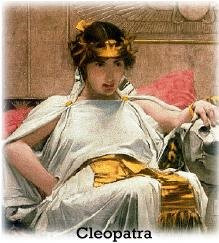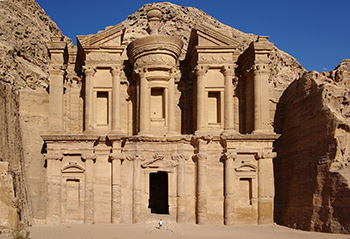The U.S. seems to be getting more involved in the Middle East all the time. There are many reasons why, but any cynical analyst will tell you that control of oil resources is at the heart of the matter.
I’m a history buff, so I can tell you that Uncle Sam isn’t the first to battle over oil in the Middle East. But most people don’t know how far back this kind of conflict goes. And what happened back in the way-back-when holds lessons for us today.
So, let me tell you about the Nabataeans, aka “the Oilmen of the Dead Sea.” It’s a story of oil, war, greed, and even involves two of the world’s most famous lovers, Antony and Cleopatra. This story has everything!
The Nabataeans built a kingdom in the 4th to 3rd centuries BC that spanned from northwestern Saudi Arabia to Syria. Their trading routes went even farther, More than a thousand years before Columbus went looking for a passage to India, the Nabataeans sailed longer distances — all the way to Southern India. In its day, the Nabataean Empire was famous throughout the world, as far as China.
The Nabataeans’ capital was Petra, (“rock” in Greek), a city carved out of stone that you may remember from the movie “Indiana Jones and the Last Crusade.”
Oil, along with a lock on the lucrative spice trade, made the Nabataeans so wealthy, explains Dr. Zayn Bilkadi, that “they are the only people in history known to have imposed a punitive tax on whomever among them grew poorer instead of richer.”
Oil Wealth Breeds Jealousy
As in present times, oil wealth bred jealousy. The Greeks sent an army to drive the Nabataeans away from their oil patch. The general leading the Greeks was Hieronymus — the famous historian — and he described what he saw on the shore of the Dead Sea. Scores of tribesmen camped on the shore next to reed rafts, waiting for what they called the thawr — the word was Arabic for “bull” — to appear in the middle of the sea.
The “bulls,” Hieronymus discovered, were great iceberg-like mounds of tarry crude oil — bitumen — that floated up from the depths of the Dead Sea. These giant chunks of floating asphalt were found after storms, which dislodged the tar from the bottom of the Dead Sea.
When the thawr reared in the waters, the tribesmen leapt aboard their rafts and paddled furiously after it. They chopped pieces of the tar off with axes, loaded up their rafts, then headed back to shore.
Sprinkled with sand, the tarry mess would then be taken by camel-back to Alexandria Egypt (then the cultural and economic center of the world) for sale. It was used in the Egyptians’ sacred mummification rituals. Bitumen was substituted for the even more expensive myrrh (the ancient words for both are very similar). Since everyone who was anyone in Egypt had to be mummified, demand for the thawr-oil was very high.
Hieronymus and his troops were under orders to drive the Nabataeans away from the oil-strewn shores and secure the prize for the Macedonians. However, Hieronymus was a better historian than a general, and he had his ass handed to him. His army was attacked by 6,000 tribesmen and massacred in a hail of arrows, and Hieronymus himself was forced to flee for his life.
Over the centuries, the immense wealth of the Nabataeans attracted one would-be conqueror after another. For a while, they crushed their enemies, but when the armies attacking them became too large, they started buying off potential adversaries with silver. This only made their enemies eye them more greedily.
A Love Story for the Ages
And this brings us to the love story. The expanding Roman empire wasn’t satisfied with huge ransoms of silver. Roman leader Marc Antony finally annexed the Nabataeans’ kingdom.
However, Marc Antony became smitten with a drop-dead gorgeous Egyptian princess, Cleopatra. She wrapped him around her finger and he gave her the Nabataean thawr-oil monopoly as a gift in 36 BC.

Cleopatra had no stomach for running a complex business, so she leased the operation back to Nabataean king Malik in for 200 silver talents a year (roughly $400,000 a year in today’s money). This is history’s first recorded lease-back operation.
That oil wealth allowed Cleopatra to build a fleet which helped Marc Antony temporarily defeat his rival for the Roman throne, Octavian.
But the Nabataeans chafed under the expensive terms of the leaseback and rebelled. Antony sent Judean king Herod to quash the rebellion, and Herod had his ass handed to him. Lacking funds, Antony was then beaten in battle by come-back kid Octavian. It was time for Antony and Cleopatra to get out of Dodge.
Cleopatra had some of her ships dragged overland to the Red Sea in preparation for an escape to India. Holding a grudge, the Nabataeans swooped down on the ships and burned them. Hopelessly trapped in Egypt, Cleopatra had her … ahem … asp handed to her, and she and Antony committed suicide.
It was a lose-lose situation for the Nabataeans as well. When Octavian became emperor, he ended the ancient Egyptian custom of mummification. It was the equivalent of modern-day Saudi Arabia’s customers switching to alternative fuels. The bottom fell out of the bitumen market, and the Nabataeans faded into history. In 747 A.D., what was left of the Nabataean civilization was destroyed in a major earthquake.
So, what lessons can we take from this ancient conflict over oil?
Lesson #1: Diversify Your Resource Base
The Nabateans thrived and died with their thawr bitumen oil. If their economy had a wider base, they might have been okay. This is a lesson that should send a shiver down the spine of every oil sheik today.
Lesson #2: Change with the Times
The Nabateans were totally unprepared for the advent of their main resource becoming obsolete. The day of bitumen faded into history. Today, we are seeing the internal combustion engine (ICE) get replaced by electric vehicles. Oil is giving way to solar and other renewables. The ICE age is coming to a close. Be ready for it.
Lesson #3: Make Friends and Partners, Not Enemies
Mark Antony and Cleopatra ended up stranded because they battled with half of Rome and alienated everyone else. They should have been making deals. Instead, they made enemies. Boy, is that a lesson that applies to the Middle East today.
One final thought: The Nabatean empire of oil was once famous throughout the known world. Now, it’s only known to most Americans because its former capital was a backdrop for an Indiana Jones movie.
Something to think about in the age of American super-power. Sic Transit Gloria Mundi.
All the best,
Sean


